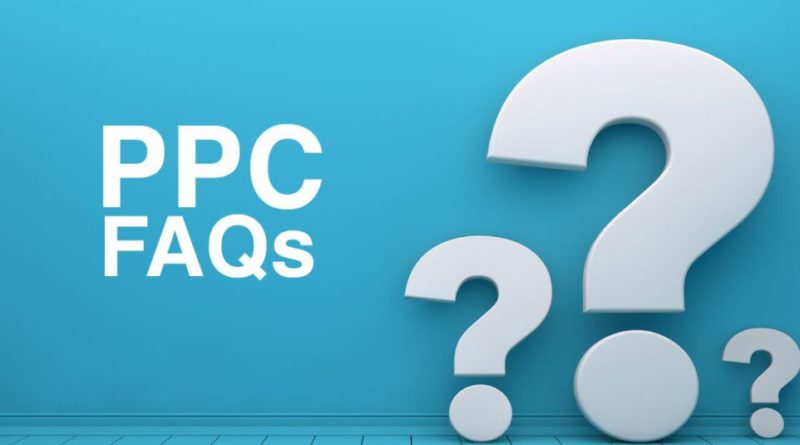PPC FAQs – Find Answers to the Frequently Asked Pay Per Click Questions
Barely anything fills entrepreneurs/business owners with the fear other than the manner in which online paid advertising does. You toss your cash at an advertisement, trusting you picked the correct platform (Google? Facebook? ) and that your advertisement changes into a lead. To enable you to make the best marketing moves for your business, we’ve gathered a compilation of the most frequently asked questions about PPC.
PPC FAQs
1. What is pay-per-click advertising?
PPC (pay-per-click) is a model of digital marketing in which the advertiser pays a charge when one of their advertisements is clicked by the user. When the user clicks on your ad, they will be redirected to your website, however, you have to pay for each click, this is why the term Pay per click is coined.
It is a particular kind of search engine marketing intended to drive more traffic to your site. At the point when keywords relevant to your domain are searched, your ad shows up in the search results.
2. Why PPC?
PPC does not require a lot of time to bring your website to the top search results and prove substantial ROI. Once you begin to avail of the service you start seeing the results immediately.
– Immediate and measurable results
– Control of budget and scheduling
– Targeted traffic
– Only pay for what you get
– Get more conversion/leads
3. What is Cost Per Click?
It is the amount for a click that is paid by an advertiser on their sponsored search listing i.e when a user clicks on your ad, the amount you pay for it is the cost per click.
4. Where do ads show up? How do I recognize them?
Ads show up at the top of the search results you get while searching for a keyword along with the right side of the results.
The PPC ads can have a few unique looks relying upon which internet searcher you choose to publicize with. For instance, “Sandals For Kids” was searched into Yahoo.com. The best four results, and the pictures/images inside the box, and the little content that is underneath it are altogether viewed as PPC advertising.
5. How to set a budget for my Google AdWords campaign?
One of the numerous choices that you will make when beginning a Google AdWords campaign for your business is the amount you might want to spend every day on your pay-per-click marketing.
There are various aspects to consider while picking your everyday budget:
– What is my general advertising budget?
– What bit of my overall budget would I like to commit to AdWords?
– Would I have a better result contributing to this money somewhere else?
– How have my Google AdWords campaigns fared previously, and how is this one the equivalent or extraordinary?
If you are uncertain of what to set your daily budget at, don’t delay to begin little and dissect the accomplishment of your test run before choosing your subsequent stage. Additionally, realize that you can change your daily budget whenever you want.
6. I see my competitor’s ads all over the place. How would we do that?
What you’re likely observing is remarketing advertisements, which we prescribe for everybody! Remarketing (or retargeting) works by setting a cookie for clients when they visit your site. This cookie at that point enables you to unequivocally focus on those clients as they peruse different sites over Google’s display network.
7. What is an ad group in Google AdWords?
An ad group is a holder of your landing pages, ads, and keywords. Google rewards sponsors who make up AdWords Campaigns with firmly organized and structured ad groups. Including all keywords into the single ad group isn’t advised rather it is smarter to arrange keywords into categories.
8. How many keywords should I have per ad group?
This is a universal question for any search campaign. Ordinarily, most account managers endeavor to keep less than 20 keywords for every ad group.
In spite of the fact that it’s totally up to you and the structure of your account, the essential concern is relevance. If you have 30 keywords in an ad group, how well is the ad content addressing every term? The ad copy and the URL of the landing page should be relevant enough.
9. What is Google AdWords Ad Extensions?
Google Adwords Ad extensions are used to boost traffic, some of the popular extensions are mentioned below:
– Sitelink Extension
– Call Extensions
– Message extension
– Callout Extension
– Affiliate location extension
– Price extension
– App extension
– Structured snippet extension
10. What sites offer PPC advertising?
With regard to PPC advertising, you have a few alternatives. Google Adwords is the most famous. However, there are a few others that you should look into. Here’s a list:
– Google Adwords
– Bing Ads
– Yahoo: Search Ads
While we have covered probably most of the frequently asked PPC questions, there are numerous others that were excluded. Our expectation is that our point by point answers will give you the data you require.
If there’s something you can’t exactly make sense of, simply go ahead and ask in the comments below and we’ll be happy to answer you!




